The Best Anime of 2017
Theron Martin, Rebecca Silverman & Zac Bertschy

We're publishing our bonus categories once per day. Today's installment is The Best Characters of 2017!

Theron Martin
Picking my top five titles for this year wasn't difficult, but ordering them was extraordinarily difficult, as I felt the top three were all about at the same level. So the differentiation between them is nebulous. Of other titles, the one that came closest to cracking my Top 5 was Yuki Yuna is a Hero season 2, whose final deciding episode hasn't yet aired. Among the rest of my top ten for the year, in no particular order are Gamers! (my pick for the year's funniest series), Inuyashiki, and the second seasons of Konosuba and Attack on Titan.
5. Made in Abyss
I was among those bowled over by the fantastic visuals and engaging premise of this series' first episode, despite having little anticipation for it heading into the summer season. Though the series was powered by visuals that beautifully enhanced its detailed and wondrous world-building, it also featured compelling characters facing equally compelling danger and some of the most horrifying and heartbreaking scenes of the year. It only makes #5 because I thought it got hurt somewhat by dragging a bit in its middle episodes.
4. Re:CREATORS
Even if not wholly original, this series' concept was nonetheless brilliant, as characters from assorted fictional worlds entered our own, “the world of the gods”, to interact with the writers and artists who created them. It was engagingly well-executed with lots of neat twists and turns, a well-constructed plot, lots of insightful commentary on the creative process, and arguably the all-time-greatest recap episode. I would rank it higher based on the first half alone, as the second half spent too long setting up for the finale.
3. Princess Principal
The steampunk setting of this original story was a beautifully realized alternate take on late 19th/early 20th century London, and the basic concept of focusing on a team of female spies was elevated by all sorts of devilish twists, including levels of deception that sometimes ran three or four layers deep. The entire core cast was a delight, bringing together some remarkably involved backstories and allowing for rare but potent bursts of humor. Even sharper was the drama brought on by those individual character stories, which fit perfectly into its largely out-of-order presentation. As the icing on the cake, the series featured neat action scenes and my favorite opening theme of the year.
2. The Ancient Magus' Bride
This was my most-anticipated title of the year, and it has not disappointed in the slightest. Granted, it probably comes from the strongest source material of any title on my list, but the anime adaptation has beautifully brought to life the story of a downtrodden girl's simultaneous discovery of the wonder of magic and her own self-worth. Elias, the skull-headed wizard, makes a great complement to her as someone trying to understand humans while also seeking to protect Chise from those who desire her powers and from her own potentially-fatal overabundance of magical ability. Watching them subtly change as they fumble around in their relationship is nearly as enjoyable as the various magical scenarios and people that they meet, and the old-school approach to magic is a welcome alternative to more modern gaming-inspired approaches in anime.
1. Saga of Tanya the Evil
Like the others in my Top 5, this series excelled at the design and depiction of its setting, in this case a war-torn alternate version of early 20th century Europe. In this world, magic is common and fully-integrated into the national military on a strategic level, a premise that's definitely been done before in anime but not to this degree of thorough detail or impact on the war. The series also stands out from other isekai reincarnation scenarios by turning the heroine into a ruthlessly self-centered individual locked in a struggle against a godlike being over matters of faith. I loved how Tanya meticulously thought things through for her own benefit, only to see her immense successes backfire on her efforts to secure a safe and cushy life, and I felt that the minor touches of humor worked into the darkly pragmatic content were perfect at maintaining the story's tone. Sharp action scenes, a wickedly expressive lead character design, and some of the year's best female seiyuu voicework (courtesy of Aoi Yuki) are all additional highlights. It earned the top spot on my list primarily because its weak points were softer than other series for me.

Rebecca Silverman
5) Kenka Banchō Otome: Girl Beats Boys
I don't think it's any secret by now that I really enjoy silly comedy, even if the first episode doesn't always hook me. Kenka Bancho Otome: Girl Beats Boys is just that – poor Hinako is one day accosted by her long-lost twin brother and forced to masquerade as him so that “he” can claim top place at his delinquent-filled high school. Hinako isn't thrilled, but she also doesn't have a choice, and before long she's fighting her way into her very own thug harem. It's patently ridiculous, made even moreso by the fact that the guys can't quite figure out that she's a girl and the sneaking suspicion that Hinako doesn't want that fact to ever come out, because she's so weirded out by the whole situation. The color-coded guys and story flow speak to this as an adaptation of an otome game, but it's definitely one of the better ones, leaning into its roots without any obfuscation. With only eight-minute episodes, the story sadly wasn't as developed as it could have been, but that doesn't stop it from being a lot of mindless fun.
4) Gamers!
As a show, Gamers was the gift that kept on giving – with each successive episode, we got more jokes about the characters and their gaming habits as everyone got more embroiled in the web of ridiculous misunderstandings that seemed to grow exponentially. Simply put, Gamers never took itself too seriously, which invited its viewers to be in on the joke. This series understood the ludicrous way high school friendships and romances work – and how utterly serious they feel at the time. Gamers captured being a teenager in the way I remember it: full of tiny issues that become huge and silly misunderstandings based on a near-total inability to understands other human beings. That it accomplished this without resorting to mean humor is a major plus, because it would have been so easy to take that route. Instead, Gamers successfully kept things light and goofy, occasionally making forays into the characters' emotions without lingering in the darkness of them. As far as I'm concerned, this is what high school comedy should look like.
3) Recovery of an MMO Junkie
Speaking of shows with relatable characters, Recovery of an MMO Junkie is definitely up there. Not just because Moriko is a woman in her thirties, which I can personally relate to, but because of how she functions in the world. Although it's never directly stated, it becomes increasingly clear that Moriko has retired from her corporate job and become a self-proclaimed NEET because she was suffering mentally from the pressures of work, reaching the point where it was essentially her job or her life. While we could easily pooh-pooh her decision to retreat, there's something resonant about her need to take a step back and relearn how to cope with both the world and her own issues that feels remarkably honest. She's a so-called “MMO Junkie” because that's how she relaxes and interacts with other people – through the safety of the screen, she can have a social life. The romance that develops from there with a fellow player in her game works because she could meet him in a situation where she felt totally comfortable – it gave her the ability to slowly transfer those skills to real life. Without the pressure of a workplace that takes up all of her energy, Moriko is able to carefully move back into the real world. That's not a story we see represented without judgment very often. It may not be the way everyone interprets this series, but if you've ever felt yourself in a similar situation, it's a good story to have around.
2) Miss Kobayashi's Dragon Maid
I have a sneaking suspicion that this will be remembered as “the lesbian dragon show.” That's certainly true – Tohru isn't shy about letting Miss Kobayashi know that she's into her sexually, and Kanna's little friend is clearly fighting similar feelings for the little dragon. But while that is an appealing part of the series, there's more to it as well – alongside the humor and romantic aspects, there's a nice story about family in here as well. When the series begins, Miss Kobayashi is at loose ends outside of her job, occasionally going out drinking with her work buddy but mostly just commuting from home to work and back. When she accidentally invites dragon Tohru to live with her, however, she doesn't bargain on getting a maid and a partner out of the deal. Whether they're romantically involved or not, sharing a home with Tohru gives Miss Kobayashi a reason to come home, relax, and have dinner with someone. When little Kanna comes to live with them too, Miss Kobayashi suddenly gets to be a parent as well – something she finds unexpectedly rewarding. By the end of the show, Miss Kobayashi has a totally new concept of what it means to come home, a far cry from the isolated existence she was leading before. Tohru, who felt estranged from most dragons in her old world, and Kanna, who's banned from going home, also find that connection – these three lonely people now have each other. It's almost tooth-rottingly adorable. It's also a really funny show (I will never get over that first shot of Fafnir at the door as a dragon) with gorgeous animation. Miss Kobayashi's Dragon Maid is just an all-around winner. I would probably tie it with my number one, but I did have to make a decision so…
1) Little Witch Academia
I do a lot of work with children's literature and folklore. Maybe that's why I always gravitate toward any iteration of “magical girl” or “girls using magic” stories when I suppose I ought to have outgrown them. (Not that I put much stock into that sort of thing.) Whatever the reason, Little Witch Academia manages to combine a lot of my favorite tropes and themes into one visually fascinating show. It's got a strong heroine, fantasy and folklore elements, and underdogs who triumph despite everyone saying that they're too weird or untalented. From a literary perspective, it also has a good use of foil figures to develop its characters and interesting mythological roots that help develop the story's world. In my education career, we talk a lot about stories that empower not just girls, but children in general. Little Witch Academia may be mostly about girls, but its messages about not giving up or letting anyone bring you down could do that for anyone, and that's part of what I love about this show.
Akko's journey to become a witch in a world that's rapidly eschewing magic for technology can certainly be read as analogous to the way analog pursuits have fallen out of favor as their digital alternatives take precedent, but at its heart, the story is more about how Akko won't let anything bring her down. People sneer at her and often doubt that she can do what she strives to, but none of that stops her. She's got that can-do attitude down, and while it can be irritating at times, it also makes her an impressive person. We don't all get to be who we dreamed of as children (possibly because there aren't any more lighthouse keepers, as in my case), but Akko does – and along the way she manages to keep believing in what's important to her and convince others that these beliefs are worthwhile. It's an empowering message that comes with a variety of other characters who are also learning about themselves – Sucy's going to be Sucy no matter what anyone has to say about that. (And Sucy is awesome.) Add to this beautiful animation and some neat imagery, as well as strong vocals from both dub and sub casts, and I can almost overlook the frustration of how Netflix released it.

Zac Bertschy
Before I get into the list proper, a few things: one, if you'd like to hear more about all these, I went into detail during our big end of the year Best of 2017 ANNCast just a few days ago, so check that out. Two: I swear I don't say this every year, but 2017 was a really great year for anime, and I highly recommend rooting around in all of these lists and pulling out all of the interesting stuff. Anyway, let's get to it.
5. Recovery of an MMO Junkie
Alright, I know this show isn't particularly substantial, but it took my #5 slot anyway. What impressed me most about this show – and the thing that pulled me in – was the respect it afforded its characters while still allowing them to be real people. This is a story about a lady in her early 30s who spends all of her time online, coping with a tremendous amount of social anxiety – rather than portraying her as a lovable cartoon obsessive or a NEET stereotype, MMO Junkie allows us to get in close and empathize with her situation without judging. Instead, we're invited to watch her slowly overcome all that terrible anxiety with the help of a charming partner, culminating in a surprisingly well-executed meet-cute. I think it's entirely possible MMO Junkie would be dramatically better as a 2-hour movie, but it's a charming, effortless little show that will be instantly recognizable – and I think particularly heartwarming – if you've ever dealt with deep dark social anxiety.
4. Kemono Friends
I'm not really sure if this is a vote for Kemono Friends the show or Kemono Friends the phenomenon, but then, I'm not sure it's even really fair to judge Kemono Friends in a vaccum. There's so much you have to consider: the outsized, hilarious and sometimes touching fan reaction to it, its weird production lineage, even its impact on the local wildlife in Japan – all of these things have to be considered when you sit down and ingest this strange, crude little 3D show set in a seemingly abandoned theme park. Yeah, it's a little hard to watch, but I think that's a huge part of its charm – this was a show made by a tiny little team working with very few resources in a short amount of time, and what they made captured the attention of what felt like the entirety of anime fandom for a few months. I hope the eventual bluray release of Kemono Friends has some kind of documentary that places the show inside all of this context. On its own, stripped of all that framing, Kemono Friends is still a surreal experience, equal parts adorable and haunting, clearly hiding something from you just out of view. Inside that context, it reveals itself as both a clever idea executed with real spark on limited resources, and as an interesting museum piece on how we engage with media these days.
3. My Hero Academia Season 2
I didn't really expect to fall so hard for My Hero Academia – my entire social media bubble went absolutely nuts for this series last year, and while I appreciated the first few episodes as well-executed Shonen Jump cereal, it was still just a bowl of cereal to me. That rapturous praise only grew louder with the release of season 2, and so I finally gave in and handed my heart over to it. A critic generally has one or two important duties: one of those is the embrace of the new, per Anton Ego – the other, I think, is to recognize and celebrate classic tropes when they're used with the kind of undeniable skill that makes them feel brand new. My Hero Academia is the best type of shonen, and it falls into that second category. It might not be telling a story I haven't heard before, but it's clever, touching, and absolutely bursting with lovable characters you're instinctively rooting for. Deku is a big wad of relatable insecurity that genuinely seems excited and passionate about his personal growth – he always does the right thing, but it isn't without a mountain of personal sacrifice and self-doubt. Far from the unflappable hero, we see all of his emotions – he gets righteously angry, and the show's flawless direction drags us right up inside his snorting rage. I connected really hard with season one and season two just expanded on everything that made the first one sing. I highly recommend diving in right now, before season 3 debuts next year – especially if you're a lapsed shonen fan who hasn't watched a long-running hit like this in a while. This is the good stuff.
2. Land of the Lustrous
If you'd told me “hey Zac in 2017 the best TV anime you're gonna see will be 3DCG” I'd have slapped myself in the face in disbelief, but here we are. Land of the Lustrous is absolutely
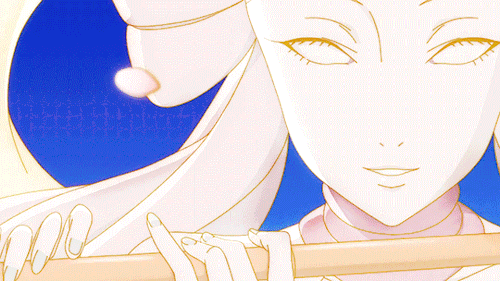
The Best
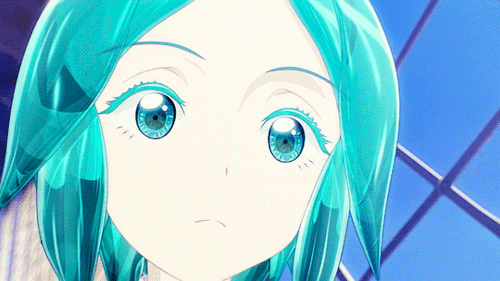
looking show this year
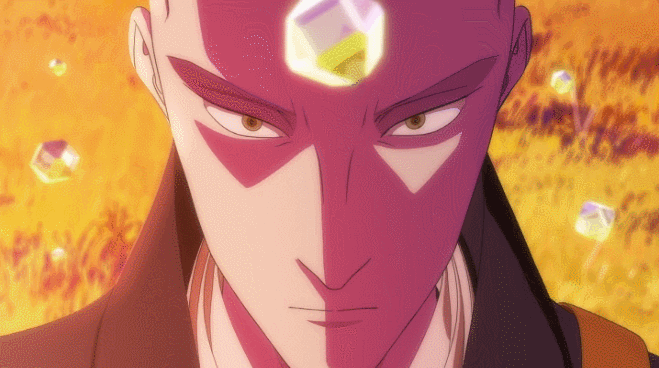
With a super cool abstract story
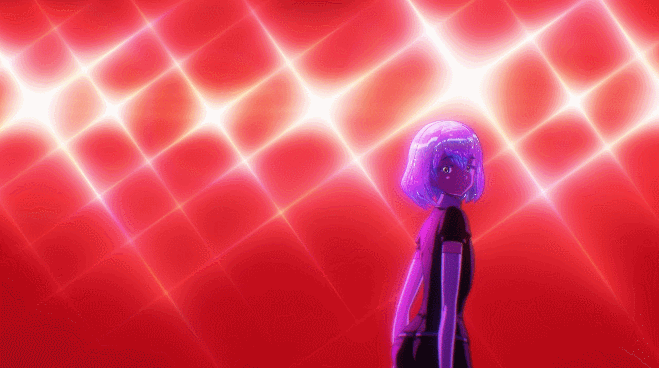
And a flawless aesthetic and color design
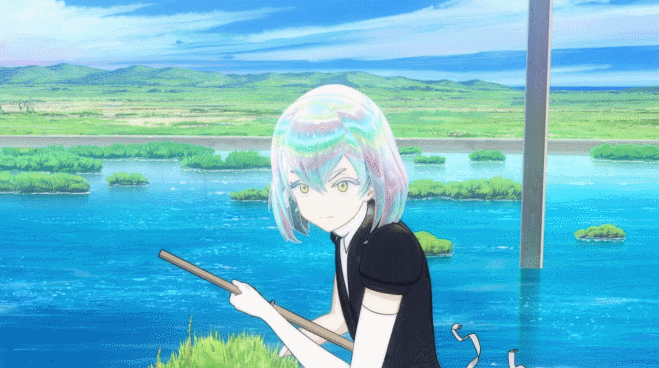
that made me gasp in disbelief at least once an episode
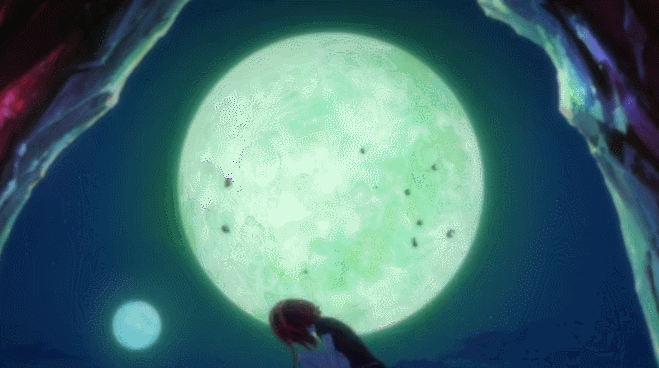
it is dope as hell. I loved it.
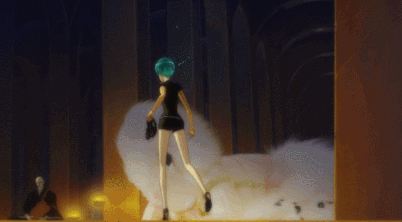
I hope they make more. Watch this show.
1. In This Corner of the World
Here's an interesting reversal – both this movie and Your Name came out in Japan in 2016 but weren't released in the US until this year. I saw Your Name in December 2016 and thus made it my #1 anime last year, acknowledging that most people would see it in 2017. This year I'm making another 2016 film my #1 – although I'm pretty certain most people in the US also didn't catch this one until this year. In This Corner of the World is a singular achievement – a brilliantly executed passion project that shows us a side of wartime we rarely ever see on screen. The people in this movie – an ordinary family in WWII-era Japan just trying to survive the conflict – aren't heroes or sitcom characters. Watching them live through this feels intimate and profoundly real, often heartbreakingly so. This film belongs on the shelf next to Grave of the Fireflies, Only Yesterday and the very best animated Japanese dramas – I think in many ways it surpasses even those, imbued with an empathy so deep it feels like flawless creative alchemy. This is out on bluray now and I can't really encourage you enough to seek it out and make time for it.
discuss this in the forum (154 posts) |
back to The Best Anime of 2017
Feature homepage / archives